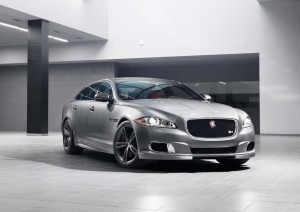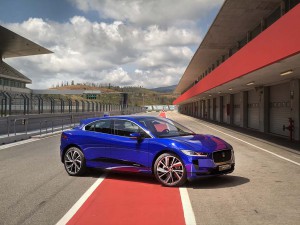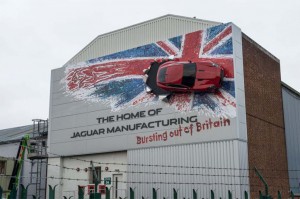
The next version of the Jaguar XJ will be all-electric. The automaker isn’t saying if it will still build gas and diesel versions of the flagship sedan, as well.
Jaguar Land Rover will invest about one billion British pounds, or $1.25 billion to allow it to produce a range of new all-electric models at its Castle Bromwich plant in the British midlands.
The announcement comes about a year after the British luxury carmaker rolled out its first battery-electric vehicle, or BEV, the Jaguar I-Pace. And the news comes exactly one month to the day after JLR formally agreed to a joint venture with erstwhile rival BMW to jointly develop next-generation battery-car technology.
“The future of mobility is electric and, as a visionary British company, we are committed to making our next generation of zero-emission vehicles in the UK,” said Ralf Speth the CEO of Jaguar Land Rover, which is a subsidiary of India’s Tata Motors.
The announcement comes as a boost to Britain’s auto industry which has been struggling in the wake of the country’s decision to leave the European Union. With British leaders unable to come up with an acceptable “Brexit” plan, a number of automakers have warned that could cut back their operations in the UK, even pull out entirely.
But JLR’s latest announcement appears to carry with it a caveat.
“Affordability will only be achieved if we make batteries here in the UK, close to vehicle production, to avoid the cost and safety risk of importing from abroad, said CEO Speth, who cautioned that a “no-deal Brexit” could wind up forcing all battery production to leave the country. “If batteries go out of the UK, then automotive production will go out of the UK.”
The I-Pace was one of the first all-electric luxury cars, the Jaguar brand following Tesla but coming to market ahead of rivals like Porsche, Audi, BMW and Mercedes-Benz, all of whom are just beginning to launch their own, long-range models.
While battery-electric vehicles have started scoring significant sales growth from a percentage basis, they still make up a fraction of the overall market, as well as the luxury segment. Industry analysts have been betting that demand on the high end could outpace that of the mainstream market because luxury buyers are less sensitive to the higher costs associated with battery-based vehicles. According to a study recently released by AlixPartners, an all-electric driveline costs about 2.5 times more than a comparable gas-based system, though costs are starting to come down as battery technology matures.
Electric motors also have the capability of delivering something else that resonates with luxury buyers: excellent performance levels, as the Tesla Model S and Jaguar I-Pace have both shown. The decision to go with an all-electric version of the XJ seems logical because of that, said Ian Fletcher, a principle automotive analyst at IHS Markit.
“The XJ has been a core model in the Jaguar range for more than 50 years and has typically epitomised the core characteristics of the brand, such as graceful and cutting edge looks, strong performance and exceptional driving dynamics,” said Fletcher, adding that, “it now seems set to follow the same direction, albeit with an electric powertrain.”
(Click Here for more on the new JLR-BMW battery-car joint venture.)
One unanswered question is whether Jaguar will continue to offer any versions of the next XJ with gas or diesel powertrains or, perhaps, a plug-in hybrid system like the technology already being offered in some of its Land Rover models. The automaker previously indicated it would offer some form of electrified technology in all new models coming to market after 2020.
It is by no means alone among luxury brands, however. If anything, high-line marques are moving even faster to bring battery technology to market than most mainstream automakers.
The announcement comes at a critical time for JLR which suffered a $4.5 billion loss for the latest fiscal year and announced 4,500 job cuts in January.
Company officials credited their union in the UK – where all but one JLR plant is located – for making the new battery-car investment possible. Workers will switch from a five to four-day workweek, though they will continue to put in the same number of hours, something the company said will increase factory productivity.



I don’t see where Jag is getting the revenue for all of their vehicle development. Tata must have very deep pockets.